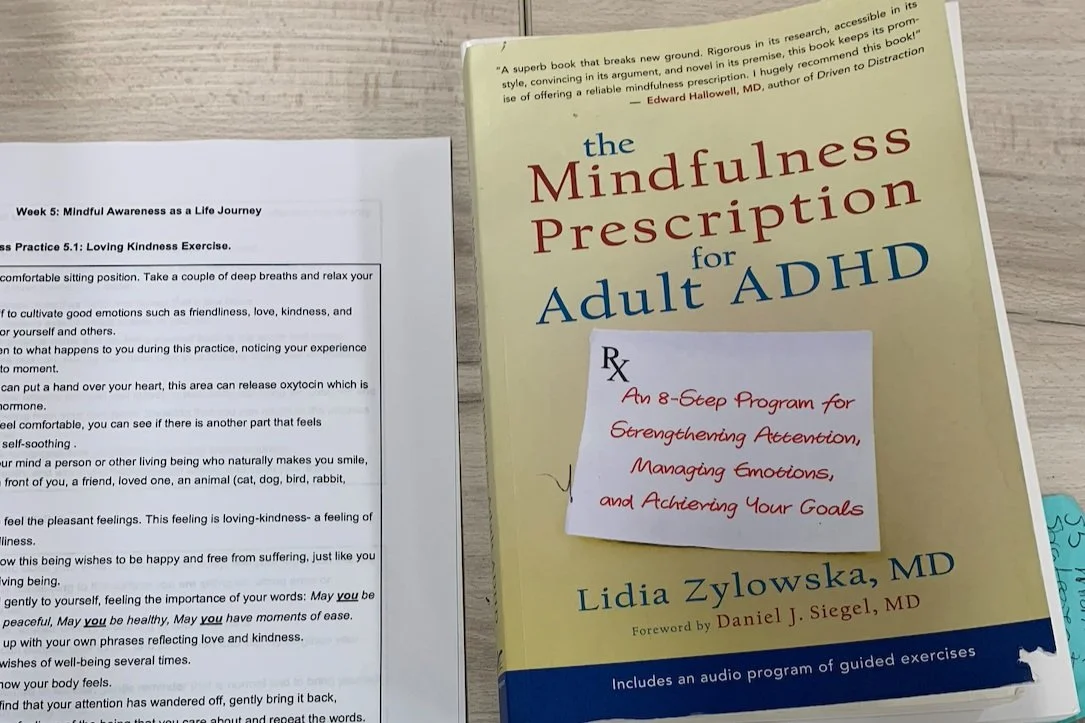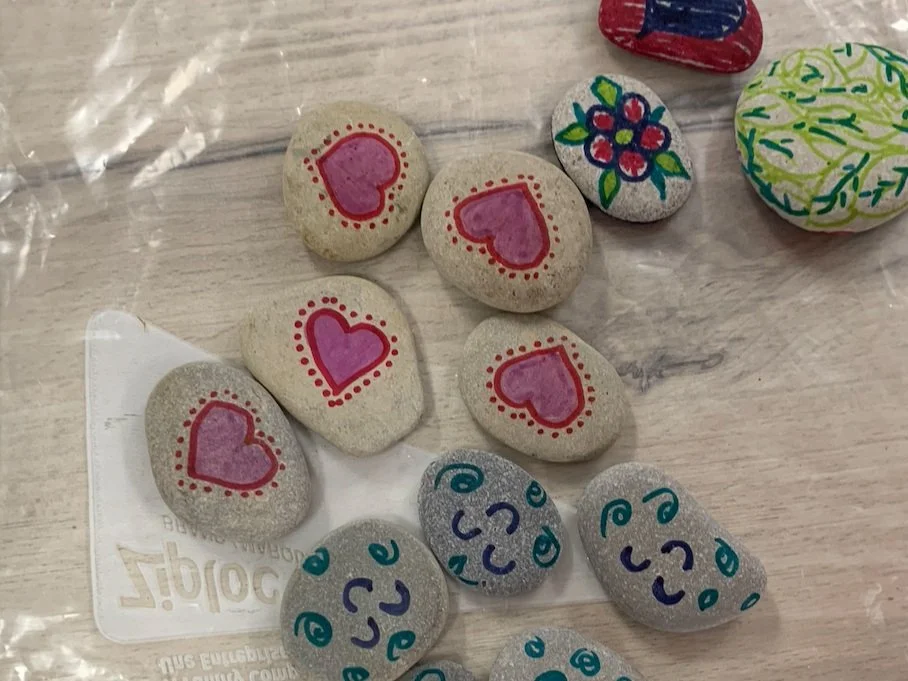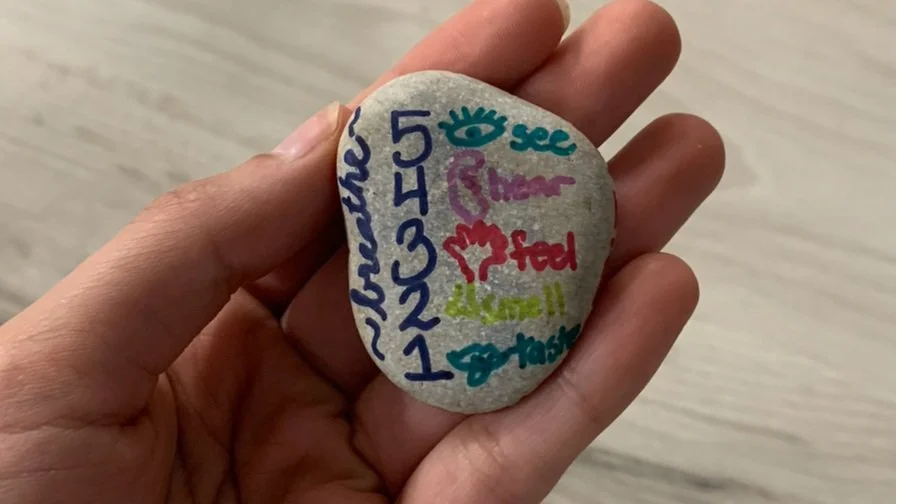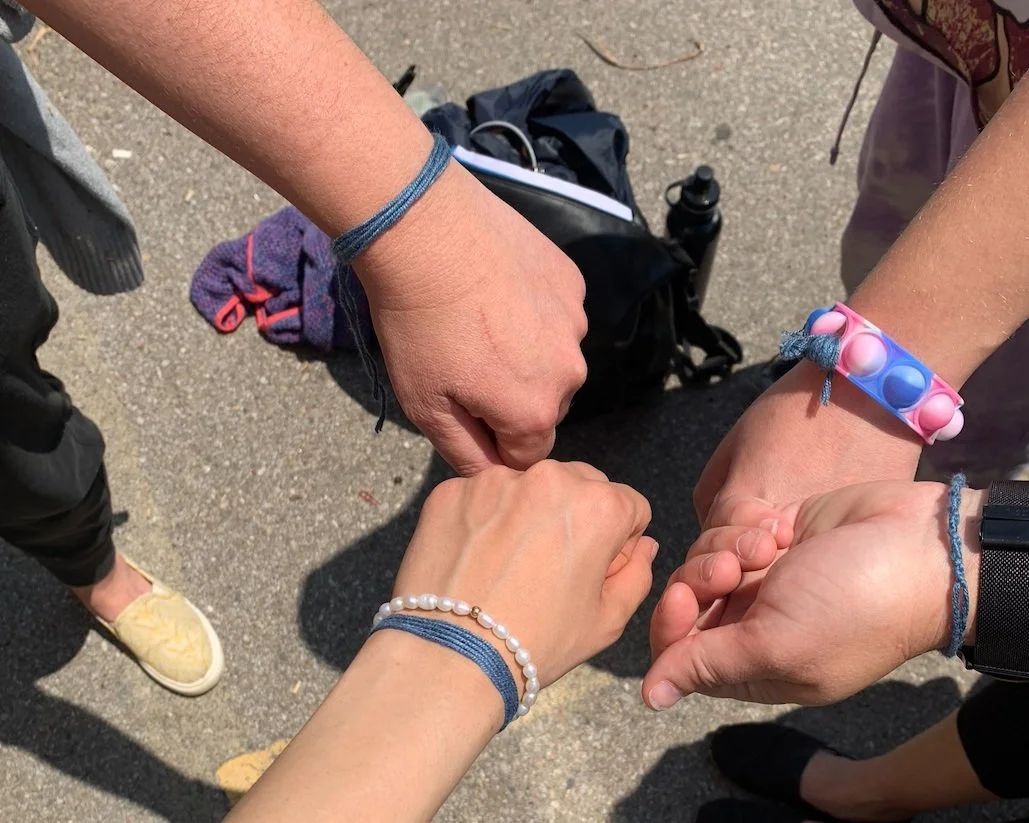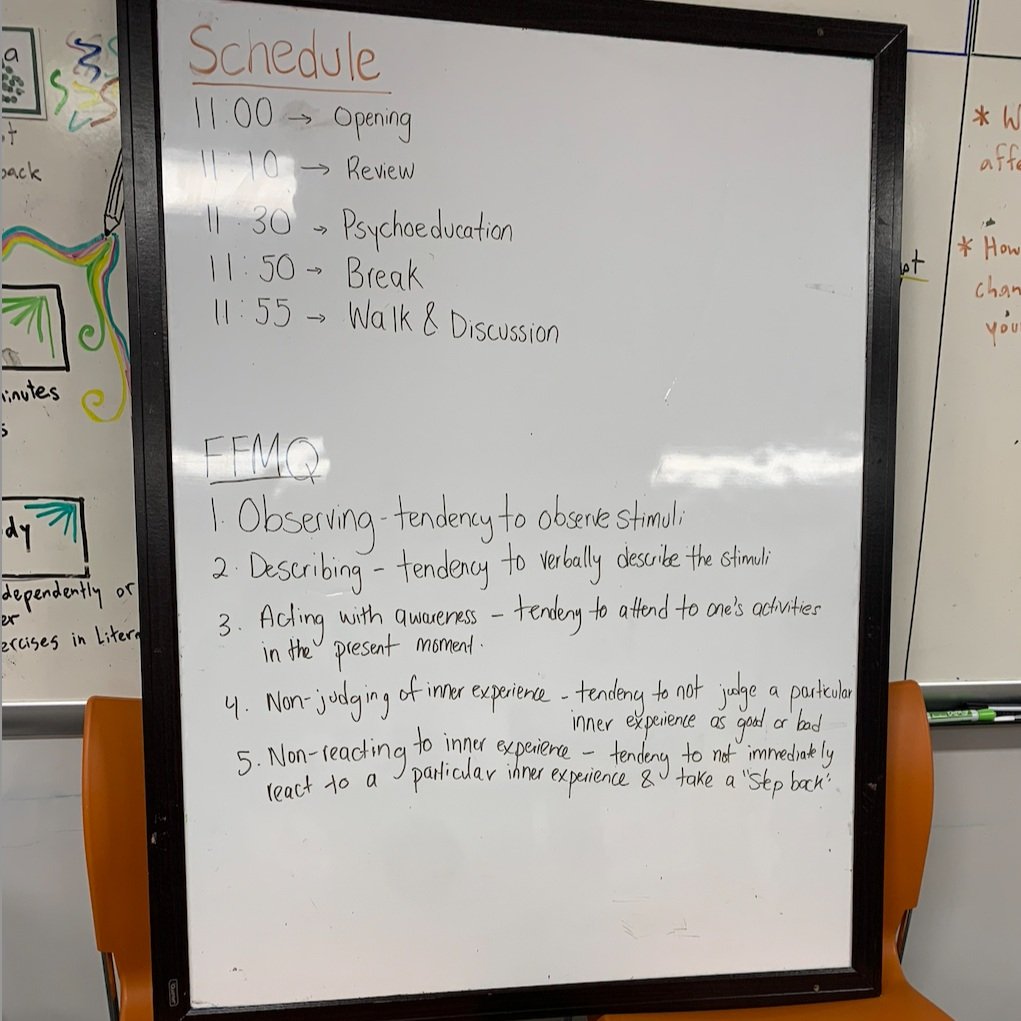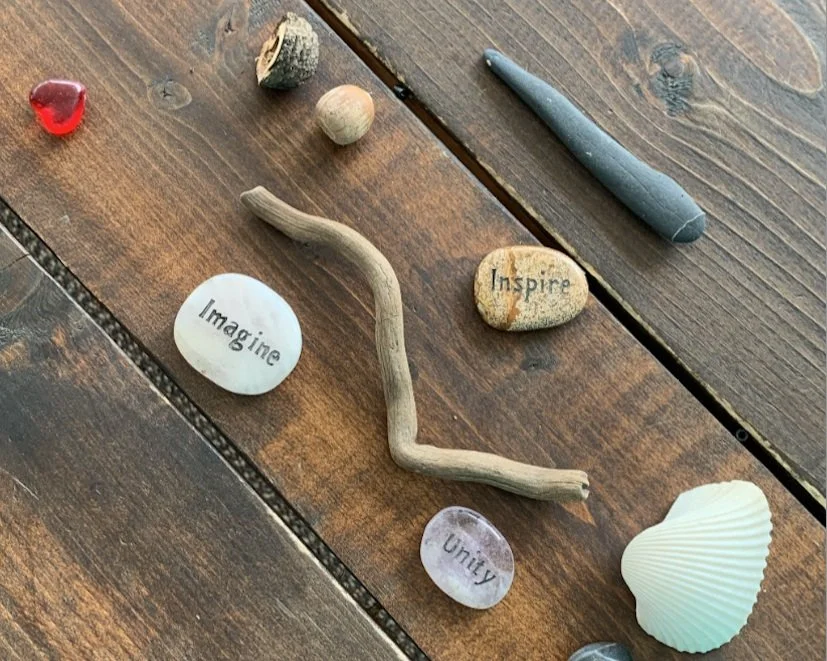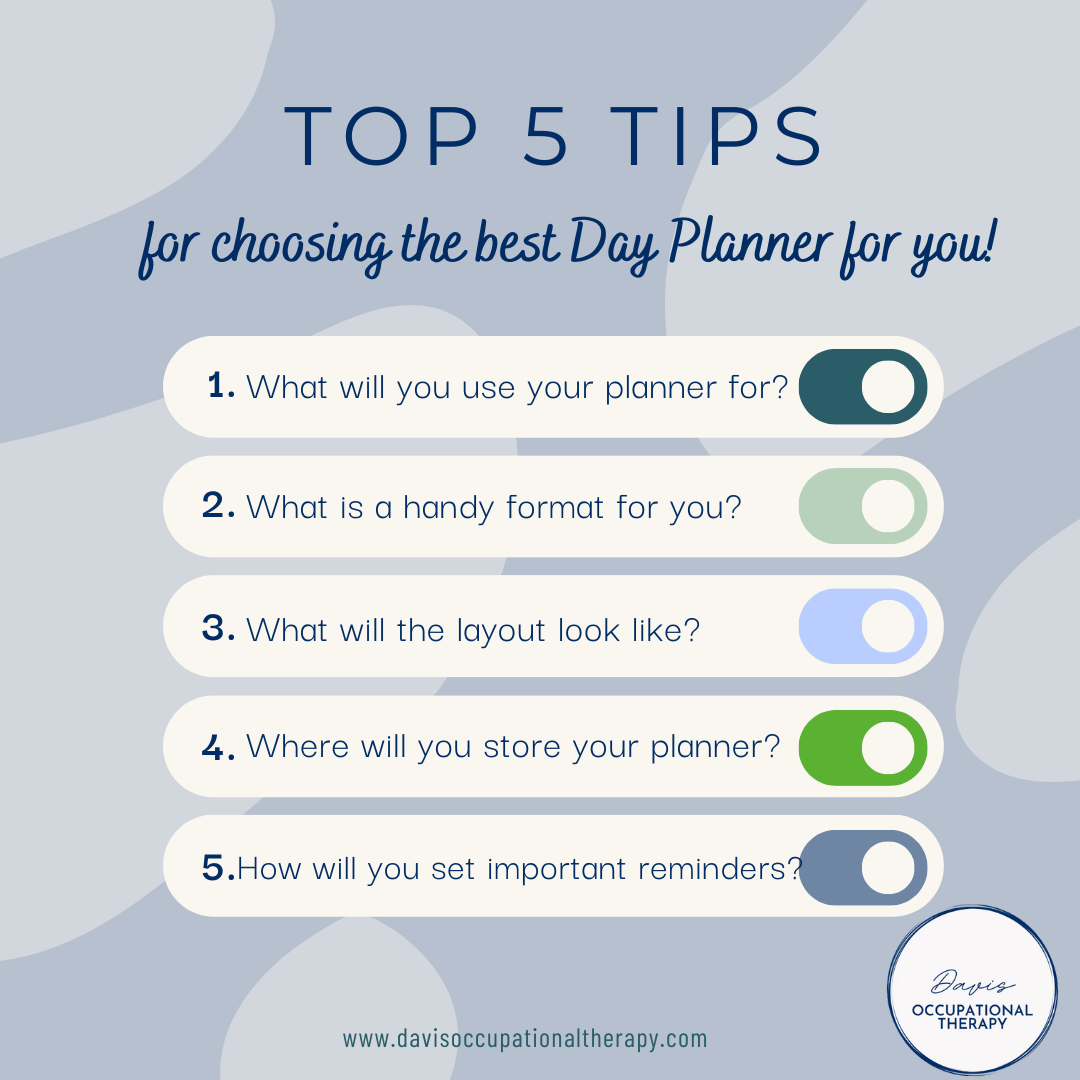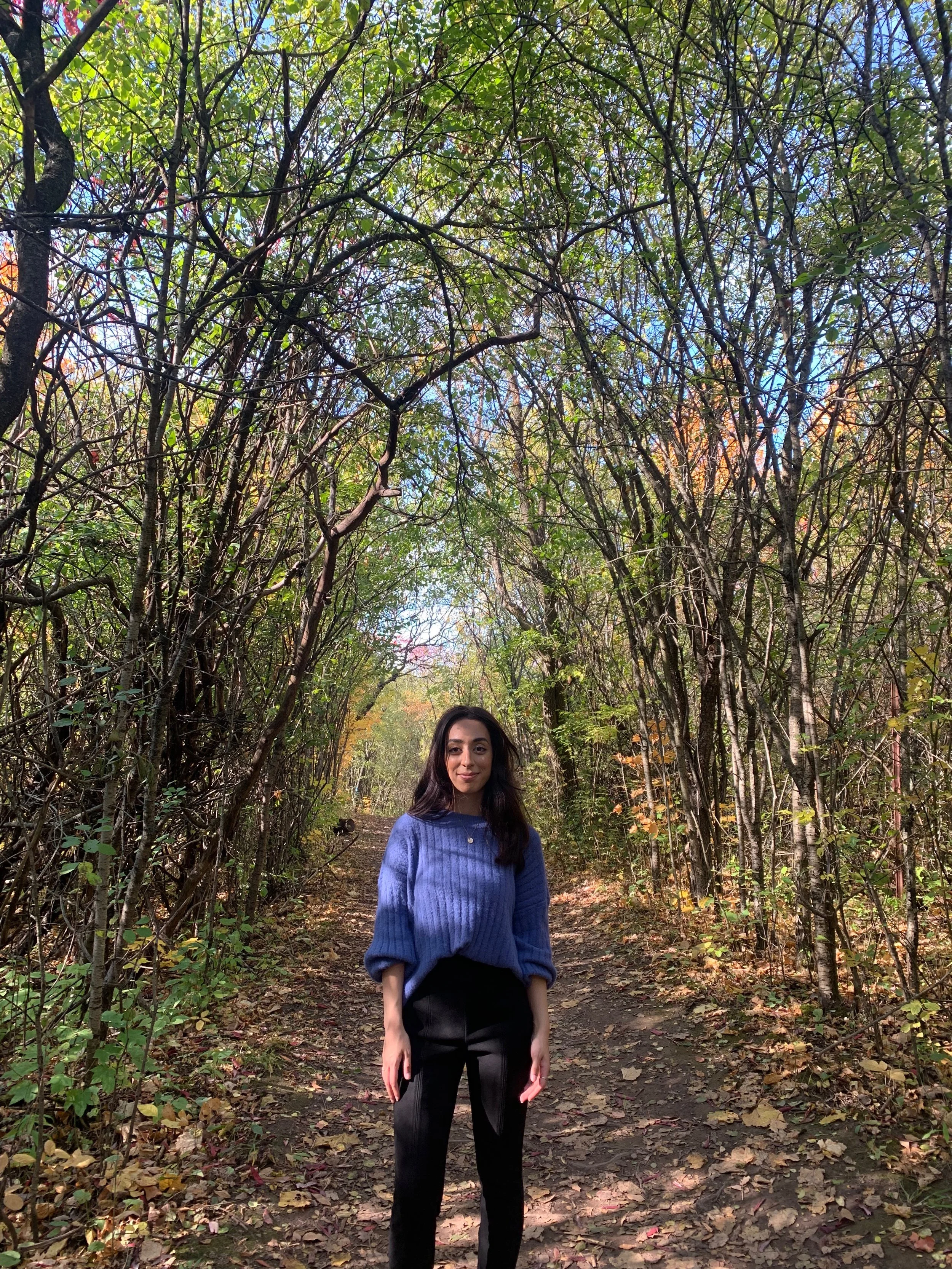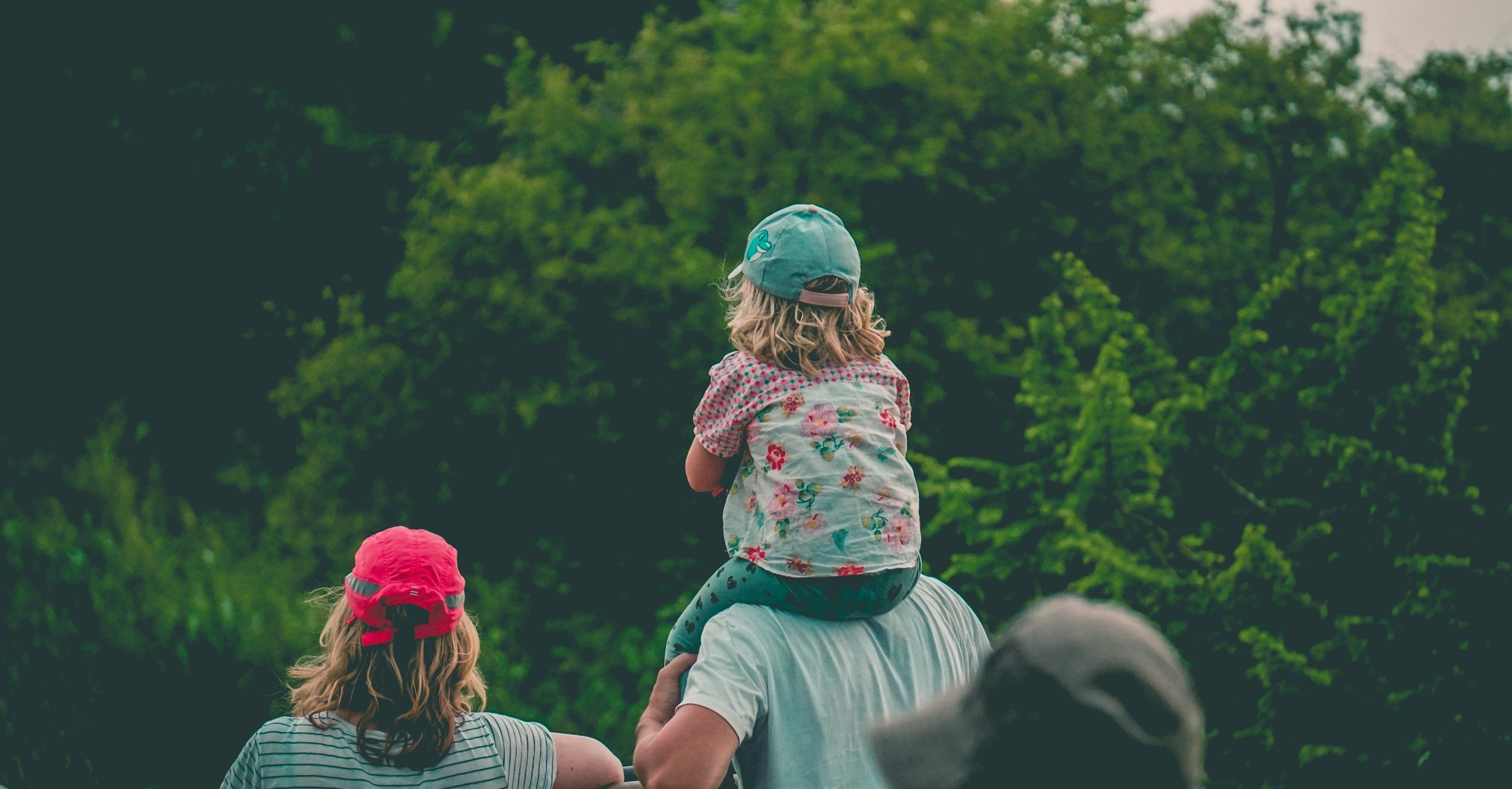
Larchwod Blog
Sneak Peak Series Continued...
Read on for our sneak peek series of the Mindfulness group for adults with ADHD - Weeks 4 and 5.
As promised, we will continue our sneak peek series within the Mindfulness group for adults with ADHD with Week 4 and 5.
Week 4
In Week 4, the group focused on Mindful Awareness of Emotions. An overview of what the group covered during this week is below:
The mindfulness exercise Leaves on a Stream to practice mindfulness of thoughts.
Exploring the importance and functions of emotions, looking at urge vs. function and discussing what it can look like for people with ADHD.
Performing the mindfulness of emotions exercise, R.A.I.N.
“ …performing this exercise [R.A.I.N.] in a busy environment in nature is helpful … the stimuli are calming… it’s like brown noise” - Participant Observation
Week 5
In Week 5, the group focused on wrapping up and ended the session with the discussion around Mindfulness as a Journey. An overview of what the group covered during this week is below:
The “stop” mindfulness exercise that can be used as a strategy in the moment or a mindfulness exercise
A discussion of the highlights and takeaways of strategies for mindfulness and ADHD that were built on over the last 5 weeks
Reflecting on our time together through a closing ceremony, giving everyone an opportunity to share, linking us together with yarn that we tied to our wrists to help remind us to take mindful moments.
“...being in this group taught me that I have what it takes to show up for myself every weekend and helped to build that sense of connection with others like me” - Participant Reflection
“It was nice to finally see the connection between practical mindfulness exercises in our day to day life versus what you hear about mindfulness in the medical world” - Participant Reflection
Thank you to the participants for showing up and attending the group and to our facilitators who put in a great deal of effort and time on a week to week basis to ensure that the group was filled with rich learning experiences.
To get on the early bird list for our next Mindfulness Group for Adults with ADHD, head to this webpage.
Mindfulness in Nature Group for Adults with ADHD
Read on for a glimpse into our 5-week Mindfulness in nature group for adults with ADHD.
A glimpse into our Adult Mindfulness Group
Our 5-week Mindfulness in nature group for adults with ADHD started on May 20, 2023. Our group contains a total of 4 participants who each bring with themselves a unique experience of ADHD which creates a sense of connectedness and belonging.The group co-facilitators are Heather, our registered Social worker and an OT Student, Wagma. Heather facilitates sharing her knowledge treating adults with ADHD and brings forth a unique perspective as she herself has an ADHD diagnosis.
“Mindfulness isn’t difficult, we just need to remember to do it”
Week 1
In Week 1, the group focused on an introduction to ADHD and Mindfulness. Here is a brief overview of what the group covered:
Established group norms and promises.
Introduction to daily mindfulness and ADHD and how mindfulness treatments are especially useful for adults with ADHD
Mindfulness work included Mindfulness of Breath and using our 5 senses in nature.
One participant coined the term “percolating” in reference to when they are having thoughts come up every now and again related to events or activities that have come up for them while they work through this.
“Nothing can cure the soul but the senses, just as nothing can cure the senses but the soul”
Fidget Items
Week 2
The group focused on Mindful Awareness of ADHD Patterns. An overview of what the group covered during this week is below:
Introduction to the mindfulness of breath exercise
Worked on non-judgmentalness, acceptance and change, radical acceptance and how these tools can be used in relation to ADHD.
Mindfulness of movement exercise and making it more accessible to ADHD traits
“As special as we might be, we experience something that other people do but just at a much higher frequency” - participant testimonial
“ Meditation is not a means to an end. It is both the means and the end.”
Overview of the day in Week 2.
Week 3
Mindfulness of the body scan practice to inform our well-being
Mindfulness of thoughts to encompass concepts around meta-awareness and cognitive defusion
Mindful "awareness of thoughts" exercise by viewing our mindful awareness as a spacious blue sky
A meaningful discussion around self-talk/affirmations
“It was interesting to note that sometimes our emotions mask the sensations in our body as a sort of a survival mechanism” - participant testimonial
This summary aims to give those who are interested in joining our 5-week Mindfulness in Nature Group for Adults with ADHD an opportunity to better understand the ins and outs of the program and to get excited about future opportunities to join this group! While also giving future participants a chance to learn more about the group through their personal experiences and testimonies.
Join our waiting list to keep informed of when we offer our next group!
Top Tips for Choosing the Best Day Planner for ADHD Adults
Many people with ADHD struggle to use a watch or a planner. This is not surprising, as both actions require a great amount of concentration. A watch reminds them of the time and a planner enables them to plan ahead. People with ADHD often live as if time does not exist. Often they have little idea of the actual time, are running late or have difficulty estimating the time needed for certain tasks. This means that tasks take more time than they thought which can result in being late for their next appointment.
Head to the Instagram page to access more resources.
”Plan your work today and everyday, then work your plan”.- Margaret Thatcher
Using a Day Planner
A planner can be a useful tool for someone with ADHD! But somebody with ADHD does not usually carry one. The following tips can help individuals start to think about ways that they can incorporate a planner into their daily routine and how to deal with not succeeding the first time.
It is recommended that individuals with ADHD learn to use a planner in stages.
First, acquire a planner, find a safe place to store it and bring it with you wherever you go!
Begin to look at the planner twice a day.
Go through the weekly structure once a week (consider doing this with a partner, friend, or a family member) and write down upcoming appointments.
1. Purpose of the planner
Think about what you want to use a planner for: work? Home life? Note taking? Appointments?
2. Format
What is a handy format for you? You should be able to carry your planner with you in a bag or jacket pocket. Book type? Electronic? Smart Phone?
3. Days per page
What is a handy layout? Often a planner with a weekly overview per two pages is handy as you can visualize the entire week at a glance.
4. Utilizing the planner on your phone
Many people like to note appointments on their mobile phone and use this as a planner. You can also set an alarm. Use this option for important appointments.
5. Finding a fixed location
Where will you leave your planner? Make a routine of this and build it into your current routine. For example, place the planner at home next to your mobile phone and your keys. Find a fixed and consistent place.
6. Notice board / Calendar
In addition to a planner, you can hang up a notice board or calendar somewhere you can see it often, for example, in the kitchen. Use it to attach appointment cards, invitations, etc. This is handy for the entire family to refer to; however it is also important to have all important dates in your day planner.
7. Regular appointments first
Firstly, enter all your fixed/recurring appointments and commitments in your planner. This will give you a sense of how much time you then have left in the week for other obligations.
8. Plan relaxation
Make time to relax, talk to your loved ones in the evenings, spend time with friends, spend time in nature or do something special just for yourself.
Important Reminders
Keep things together
Keep things that you need together in a fixed place (e.g. your keys, phone, and planner). You will then have less chance of losing them or forgetting to take them with you.
2. Possible pitfalls
Not starting to use the planner until you have come up with a perfect system. This often results in not using a planner at all. Remember to start in phases, small steps!
Giving up if you don’t succeed in using a planner. Allow yourself time to get used to it. Find out what the problem is and look for a solution. It takes time to develop a routine and it will be by trial and error.
Have you found a great day planner? Please share in the comments.
References: Kooij. (2012). Treatment: Coaching Adults with ADHD. In Adult ADHD (pp. 169–207). Springer London. https://doi.org/10.1007/978-1-4471-4138-9_5
You are the sky. Everything else is just the weather - Pema Chodron.
Hello! My name is Wagma and I'm a second year occupational therapy student at Western University, on an exciting journey (and a period of transition) where I am beginning my last placement right here at Davis Occupational Therapy! I am so excited to embark on this new journey from being a student to a practicing professional soon. I am most excited to expand my learning through the mindfulness group tailored for adults with ADHD by taking on the role of a co-facilitator with Heather and I believe that my passion lies right here and am confident that I will grow and learn more about myself and my values during my time here.
Grateful to be here :)
A little about me, I am a huge mental health advocate! As an individual who has faced unique challenges to her own mental health for more than a year or so I have had many personal experiences of finding what works best for me. A few of those things has been practicing mindfulness and practicing daily gratitude. I noticed that when I started to become grateful for the little things in life and I started to practice being in the present through mindful activities that the progress I was making every day started to really add up. I don't consider myself an expert in mindfulness since this is just my personal journey but I see myself contributing to other people's journey whether that may be a journey with a mental health challenge or not.
“The only way we have of influencing the future is to own the present, however we find it”
I love spending time outdoors, connecting with nature, and focusing on how to connect my mind, body, and breath to the external environment. As we approach the warmer weather, you can catch me doing breath work in my backyard or curled up with a good book. I love working with all ages, whether that be kids or adults, because the benefits of nature and mindfulness can benefit everyone. Learning how to become mindful is such an important skill to have especially when there are so many distractions in today's world. I cannot wait to see how these skills flourish in the mindfulness group and how I can contribute to this trajectory of change.
“believing in yourself and trusting that you are on the right path, and not being in doubt by following the myriad footpaths of those wandering in every direction”

